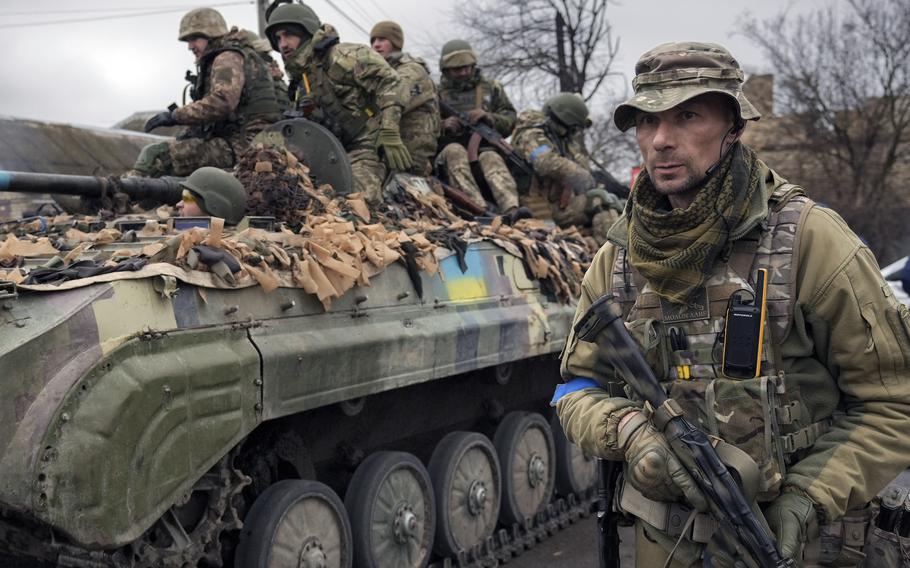
A Ukrainian service member walks next to a fighting vehicle, outside Kyiv, Ukraine, on Saturday, April 2, 2022. As Russian forces pull back from Ukraine’s capital region, retreating troops are creating a “catastrophic” situation for civilians by leaving mines around homes, abandoned equipment and “even the bodies of those killed,” President Volodymyr Zelenskyy warned. (Vadim Ghirda/AP)
WASHINGTON — More Russian troops are pulling back from their advance on Ukraine’s capital city of Kyiv as invading forces intensify their attack in the separatist region of Donbas in the east, a senior U.S. defense official said Monday.
About two-thirds of the 20 fast-response units — known as battalion tactical groups — Russia had surrounding Kyiv in the war’s first five weeks have turned back north into Belarus since last week, said the official who spoke on the condition of anonymity.
“What we continue to believe is that [the Russian troops] are going to be refit, resupplied, perhaps maybe even reinforced with additional manpower and then sent back into Ukraine to continue fighting elsewhere,” the official told reporters at the Pentagon.
While the “vast majority” of Russian forces deployed for the invasion remain in Ukraine, the 20 fast-response units that surrounded Kyiv represented nearly 17% of the 125 battalion tactical groups used by Russia to launch its war more than five weeks ago, the official said.
In total, Russia has about 168 of such groups, Russian Defense Minister Sergei Shoigu told Russia’s state-owned TASS news outlet in August. Each unit has about 800 infantrymen.
Russia’s shift away from the capital city comes after weeks of stalled movement toward Kyiv. Russia’s Defense Ministry now claims their goal was always to “liberate” the Donbas region — not overthrow Kyiv and the Ukrainian government.
"Clearly the maximalist goals originally set out by Mr. Putin have not been attained, have not been reached,” the U.S. defense official said. “He made it very clear publicly what he was going after, no matter what their narrative is now."
The changed messaging is part of “classic Russian behavior” in attempt to save face in the public sphere, the official said.
“[Putin] made it very clear he was after regime change in Ukraine, and a key piece of achieving that regime change was taking the capital city. He has failed to do that, and they are now moving away on the ground. They're moving away from Kyiv."
Indications of the refocus are now appearing elsewhere in Ukraine, as well, as the official said some forces north of the southern city of Mariupol “may be aiming to push north to Donetsk,” a separatist city in the Donbas region.
"Again, that's in keeping with what we said that they would want to close off that Donbas area,” the official said.
While Russia for weeks has made more progress in southern Ukraine, their forces have now “gotten pinched in between Kherson and Mykolaiv” in the south, the official said.
“We have analysis that they've shifted much more to a defensive posture around Kherson,” the official said.
Still, Russia over the weekend launched airstrikes on Odesa in southeastern Ukraine, claiming to have struck an oil depot in the port city on the Black Sea.
Russia’s reasoning behind this is unclear and there are “no major signs of an imminent amphibious assault” on the region, the official said, though some Russian navy landing ships have been “conducting security patrols south of Odesa.”
“It could be they are [preparing to] move on Odessa,” the official said. “It could be they're simply doing that to try to pin down Ukrainian forces there — make them think that there's something big coming in Odesa so they stay and try to protect the city."
Russia has also been refocusing their airstrikes on Izyum in eastern Ukraine near a Ukrainian joint-forces area, the official said.
Izyum, which is in the Kharkiv region, “is important in organizing the defense of … the Donetsk region,” the Ukrainian military said in a statement Friday announcing Russia had gained control of the city.
“Previously, the [Russians] claimed that it is more reasonable to focus on the occupation of the Donetsk and Luhansk regions,” the Ukrainian military said in the statement. “Therefore, regrouping was in motion over this week.”
The Ukrainian military also predicted Russian forces moving from the Kyiv region “would be directed at strengthening the units trying to attack the territory of the joint-forces operation” near Izyum, according to the statement.
So far, Russia has launched more than 1,400 missiles since the war started Feb. 24, which "isn't a major change in the numbers" since Friday, the official said.